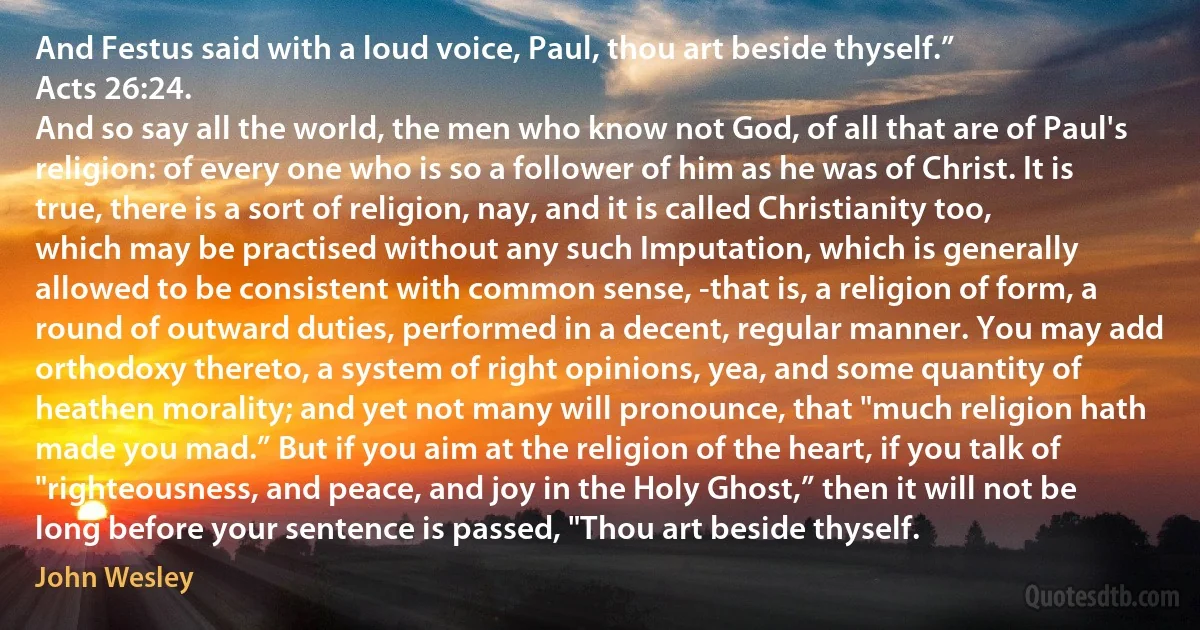
And Festus said with a loud voice, Paul, thou art beside thyself.” Acts 26:24. And so say all the world, the men who know not God, of all that are of Paul's religion: of every one who is so a follower of him as he was of Christ. It is true, there is a sort of religion, nay, and it is called Christianity too, which may be practised without any such Imputation, which is generally allowed to be consistent with common sense, -that is, a religion of form, a round of outward duties, performed in a decent, regular manner. You may add orthodoxy thereto, a system of right opinions, yea, and some quantity of heathen morality; and yet not many will pronounce, that "much religion hath made you mad.” But if you aim at the religion of the heart, if you talk of "righteousness, and peace, and joy in the Holy Ghost,” then it will not be long before your sentence is passed, "Thou art beside thyself.
John WesleyRelated topics
add aim art beside christ common form ghost heart heathen holy imputation joy men loud mad orthodoxy peace pronounce religion right round say sense sort talk thou voice world yea yet actsRelated quotes
Then fail not most carefully to peruse the books of the Greek, Arabian, and Latin physicians, not despising the Talmudists and Cabalists; and by frequent anatomies get thee the perfect knowledge of that other world, called the microcosm, which is man. And at some of the hours of the day apply thy mind to the study of the Holy Scriptures; first, in Greek, the New Testament, with the Epistles of the Apostles;: and then the Old Testament in Hebrew. In brief, let me see thee an abyss and bottomless pit of knowledge; for from henceforward, as thou growest great and becomest a man, thou must part from this tranquillity and rest of study, thou must learn chivalry, warfare, and the exercises of the field, the better thereby to defend my house and our friends, and to succour and protect them at all their needs against the invasion and assaults of evildoers.

François Rabelais
We have entered a time of global transition marked by uniquely contradictory trends. Regional and continental associations of States are evolving ways to deepen cooperation and ease some of the contentious characteristics of sovereign and nationalistic rivalries. National boundaries are blurred by advanced communications and global commerce, and by the decisions of States to yield some sovereign prerogatives to larger, common political associations. At the same time, however, fierce new assertions of nationalism and sovereignty spring up, and the cohesion of States is threatened by brutal ethnic, religious, social, cultural or linguistic strife. Social peace is challenged on the one hand by new assertions of discrimination and exclusion and, on the other, by acts of terrorism seeking to undermine evolution and change through democratic means.

Boutros Boutros-Ghali
The advance of liberalism, so-called, in Christianity, during the past fifty years, may fairly be called a victory of healthy-mindedness within the church over the morbidness with which the old hell-fire theology was more harmoniously related. We have now whole congregations whose preachers, far from magnifying our consciousness of sin, seem devoted rather to making little of it. They ignore, or even deny, eternal punishment, and insist on the dignity rather than on the depravity of man. They look at the continual preoccupation of the old-fashioned Christian with the salvation of his soul as something sickly and reprehensible rather than admirable; and a sanguine and 'muscular' attitude, which to our forefathers would have seemed purely heathen, has become in their eyes an ideal element of Christian character. I am not asking whether or not they are right, I am only pointing out the change.

William James
At the point at which the concept of différance, and the chain attached to it, intervenes, all the conceptual oppositions of metaphysics (signifier/signified; sensible/intelligible; writing/speech; passivity/activity; etc.)- to the extent that they ultimately refer to the presence of something present (for example, in the form of the identity of the subject who is present for all his operations, present beneath every accident or event, self-present in its "living speech," in its enunciations, in the present objects and acts of its language, etc.)- become non pertinent. They all amount, at one moment or another, to a subordination of the movement of différance in favor of the presence of a value or a meaning supposedly antecedent to différance, more original than it, exceeding and governing it in the last analysis. This is still the presence of what we called above the "transcendental signified.

Jacques Derrida
Let a man get once fairly possessed of any peculiar notion, whether it be on religion, political economy, morals, politics, arts, or anything else, and he sees little beside his beloved principle, which he is at all times ready to advance, defend, demonstrate, or expatiate on. Nothing can be simpler than the two great dogmas of Christianity, which are so plain that all can both comprehend them and feel their truth. They teach us to love God, the surest way to obey him, and to love our neighbor as ourselves. Any one can understand this; all can see how just it is, and how much of moral sublimity it contains. It is Godlike, and brings us near the very essence of the Divinity, which is love, mercy, and truth. Yet how few are content to accept the teachings of the Saviour in this respect, without embarrassing them with theories that have so much of their origin in human fancies.

James Fenimore Cooper
